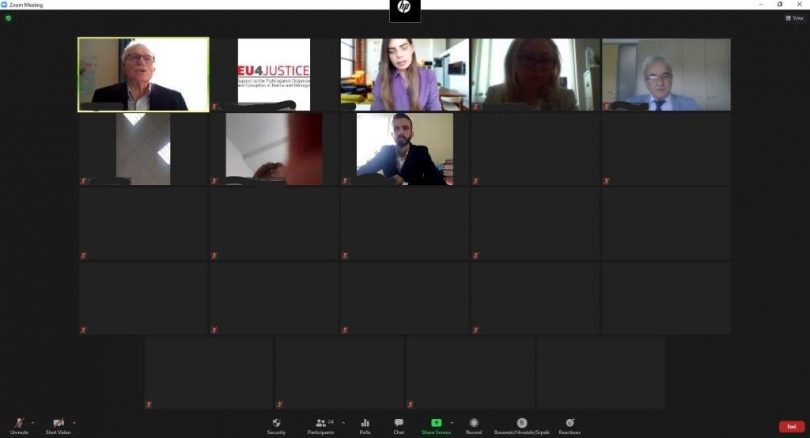EU4Justice project, in cooperation with CEST FBiH and CEST RS, organised online training for judges and prosecutors on Mutual legal assistance in criminal matters and extradition.
The Manual on “Mutual legal assistance in criminal matters and extradition” (MLA) was presented during this training as well.
The work on this Manual took several months of collaborative work of international expert Mr Bernard Rabatel and national expert Mr Nikola Sladoje. Both experts have an extensive background in mutual legal assistance which they transferred in the Manual.
Mr Bernard Rabatel has been a member of the French Judiciary (magistrate) for 40 years, while Mr Sladoje is in BiH judiciary since 2003, and is working as the Assistant Minister of Justice of BiH and as the Head of the Sector for Mutual Legal Assistance and Cooperation in Criminal and Civil Matters since 2004. We spoke to them about their experiences in the MLA area.
When asked about the experiences he had while working abroad as liaison magistrate and what were the main issues arising in an MLA case, Mr Rabatel explained that he has worked for 11 years as a French liaison magistrate in the USA, first at the Justice Department in Washington, DC, and then in the United Kingdom, at the Home Office in London, and this gave him the chance to work in quite different legal areas.
“Law students learn at the faculty, that there are various judicial systems in the world, some of which are difficult to be compatible with because of their differences. This alleged incompatibility is often illustrated by the coexistence between, on the one hand, the system of continental law, in particular the French judicial system, on the other that of the common law to which the UK and the USA belong. Reality is slightly different. We no longer find an inquisitorial-only system or an accusatorial-only system, given that they tend to be converging to a greater or lesser extent, as may be seen in BIH over recent years.” – stated Mr Rabatel.
He added that during those years abroad, there was a lot of goodwill among his foreign colleagues to make MLA more efficient and effective and to facilitate it in practice.
However, Mr Rabatel pointed out that his experience shows that the first and main obstacle faced by the prosecutor or investigating judge, when they need assistance from a foreign country with a legal system different from what it is at their home, is the persistence of misunderstandings created by the actual or supposed differences between the judicial systems. Language barriers do not help.
Elaborating further, Mr Rabatel pointed out that in bilateral criminal judicial cooperation, these misrepresentations of the judicial system of the other have often led, in the past, to a form of self-censorship. Thus, for example, a judicial official who intended to request an interview of a witness abroad or to gather other evidence (taking fingerprints, to subpoena bank documents, asset freezing, etc.) could legitimately hesitate to transmit an international letter of request: long lead times, and the randomness of its execution sometimes gave him the impression of throwing a bottle into the sea…
Fortunately, in recent years progress in international cooperation has been made, in particular regarding the exchange of information between judicial authorities, possibly in coordination with Eurojust. The creation of joint investigative teams in which prosecutors, investigating judges and law enforcement officers participate in combating crime, has made it possible to take down some legal barriers that stopped them but not criminals. In countries where a liaison magistrate has been appointed, his colleagues can contact him when drafting an international letter of request, taking into account the specific requirements of the foreign legal system. They may also be informed in real-time about the action taken on their request.
“The implementation of the principle of mutual recognition of legal decisions in criminal matters, expression of mutual trust in each other’s legal systems, has contributed to raising a new vision to the judicial cooperation. One of the best examples being, among the EU Member States, the European arrest warrant which abolished the administrative phase of extradition procedure, placed the decision entirely under the authority of courts of the Member States, and has facilitated the surrender of fugitives sought by justice.” – emphasised Mr Rabatel.
However, he did notice that despite these major steps forward, several obstacles to cross-border cooperation remain. For instance, in the absence of a treaty or arrangement, judicial assistance can only be afforded if the principle of reciprocity applies, which is not always clear in practice.
In an age of globalization and of the acceleration of exchanges, including the extent of organized crime, several States still forbid the extradition of their nationals, a situation which complicates the administration of justice. Judicial officials are aware that the principle “aut dedere aut judicare”, the obligation to extradite or prosecute, is still far from being enforced in practice in several countries outside the European Union.
“These are just some concrete examples of remaining key issues met by judicial actors in MLA. Nevertheless, I am convinced that, with the new legal instruments and mechanisms available to prosecutors and judges, we are on the right track even though a lot of work has still to be done in international judicial cooperation.” – pointed out Mr Rabatel.
In the context of the BIH prosecutors and judges, Mr Rabatel points out that during his missions to BiH he met with prosecutors and judges who are experienced, qualified, and committed justice professionals.
His advice on MLA issues is to keep going forward (no self-censorship), taking into consideration the recommendations contained in the Guide on MLA in criminal matters and extradition.
“The requirements mentioned in it for each procedure, for every country in question, should serve as a good set of guidelines for MLA. I would recommend them to draft their requests as clearly and specifically as possible, to prevent possible misunderstandings and misperceptions, often caused by linguistic confusion which is not always confined to legal nuances of different languages.” – stated Mr Rabatel.
His recommendation is not to stand by in lengthy processing times or the absence of any response, and when feasible, to make direct contact with their counterparts in other countries to whom requests were addressed. Emphasizing that there is no better tool than human contact to make things happen.
However, he did remind us that it must also work the other way: equal attention should be paid to foreign MLA requests received in their offices. No difference should be made between such requests and their domestic criminal cases. As he points out based on his experience, this legitimate aim has not yet been properly achieved in several countries.
Five countries are singled out in the Manual. We have asked Mr Sladoje to explain the reasoning behind this decision.
“Each country is selected because of the specificities. The reason we opted for Serbia, is in the fact that Bosnia and Herzegovina, has the largest quantity of MLA requests with Serbia. Croatia is right behind with the MLA requests, the difference being is that Croatia is an EU member state. On the other hand, Germany is the country with which BiH had the largest number of MLA cases, more specifically in extradition cases? The reason we have included the USA is that that is a country that Bosnia and Herzegovina have a large number of cases without responding to bilateral contracts. And finally, we have included China as one of the most populated countries on the planet, with which we have bilateral contacts concluded.” – explained Mr Sladoje.
He also emphasised that these five countries are prisms through which all other countries in the world can be observed in the aspect of MLA cases.
The Guide explains all forms of international legal assistance in criminal matters, gives examples of possible forms required, and lists the legal basis for all countries individually (laws and international treaties) and their publication in official gazettes.
In the context of the European arrest warrant mentioned by Mr Rabatel, Mr Sladoje explained that since Bosnia and Herzegovina is not an EU member, access to a European arrest warrant is not possible.
In the context of the European arrest warrant mentioned by Mr. Rabatel, Mr. Sladoje explained that since Bosnia and Herzegovina is not an EU member, access to a European arrest warrant is not possible, but BiH has concluded, as the first phase of approaching the warrants, bilateral agreements with the countries of the region which enable the extradition of their own citizens.
The MLA Manual will be shared with the HJPC so they can assess if the Manual will be included in the official recommendations of the HJPC.






